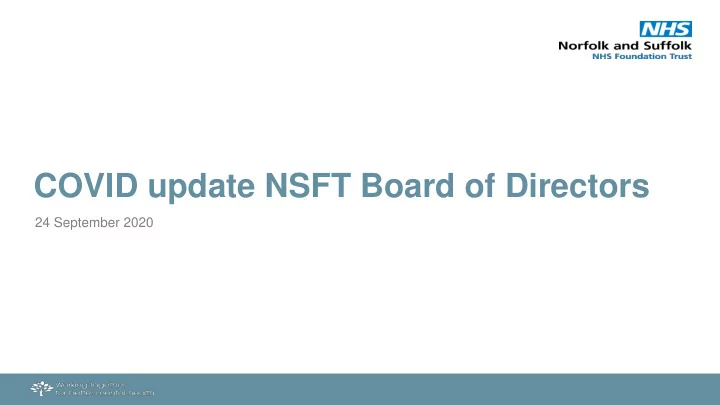

COVID update NSFT Board of Directors 24 September 2020
NSFT COVID response strategic priorities • Minimise all causes of mortality amongst patients under the care of NSFT’s teams and services • Continue to provide high quality mental health care to people with severe mental disorders under CPA in Norfolk & Suffolk • Support the general mental wellbeing of the populations in Norfolk & Suffolk • Prevent transmission of COVID by NSFT’s employees • Maintain the health and wellbeing of NSFT’s staff • Support the mental health and wellbeing of all staff working in the NHS and care sectors in Norfolk & Suffolk • Use COVID 19 resources wisely to prioritise the care of people most in need of support • Minimise the long-term impact of COVID-19 on mental health care for people in Norfolk & Suffolk
National Overview • As of 21 st September 2020, the UK is reporting 394,257 cases and 41,866 COVID-19 deaths in hospital • Between 1 March and 31 July 51,831 deaths in England & Wales involved COVID (20% of total) • 1,209 people with a mental health All cause mortality in England and Wales condition (4% of total) and 523 with LD or 16,000 Autism have died from COVID-19 14,000 12,000 • Impact almost 2x higher in the most 10,000 deprived populations 8,000 6,000 • Latest ONS data from w/e 4/9/20 4,000 2,000 suggests below-average total mortality for 0 the first time since the incident began Deaths not involving COVID All deaths - Five-year average COVID-19
East of England • Excess deaths during COVID incident comparable to national pattern • Impact in all levels of deprivation • Norfolk reported 572 excess deaths in total (86% due to COVID) • Suffolk reported 702 excess deaths in total (80% due to COVID) • Commonest other cause of excess death was Dementia (634 cases) • Prevalence in EoE remains low despite local variation
Activity and Demand in NSFT New External Referrals received per Week 1200 1000 • Rate of new referrals now 800 comparable to pre-COVID 600 • Number of contacts remains above 400 Total 200 pre-COVID level 0 • Face to face contacts have 2019-09-09 2019-09-23 2019-10-07 2019-10-21 2019-11-04 2019-11-18 2019-12-02 2019-12-16 2019-12-30 2020-01-13 2020-01-27 2020-02-10 2020-02-24 2020-03-09 2020-03-23 2020-04-06 2020-04-20 2020-05-04 2020-05-18 2020-06-01 2020-06-15 2020-06-29 2020-07-13 2020-07-27 2020-08-10 2020-08-24 increased to around 30% of total • Telemedicine accounts for around 5% of contacts Contacts by Type per week 14000 • Largest proportion remain telephone 12000 contacts (around 63%) Telephone 10000 Telemedicine 8000 • First Response demand increasing Talk Type 6000 in line with national trend, SMS 4000 particularly at weekends. 2000 Not Recorded 0 Face-to-Face 2019-01-14 2019-02-11 2019-03-11 2019-04-08 2019-05-06 2019-06-03 2019-07-01 2019-07-29 2019-08-26 2019-09-23 2019-10-21 2019-11-18 2019-12-16 2020-01-13 2020-02-10 2020-03-09 2020-04-06 2020-05-04 2020-06-01 2020-06-29 2020-07-27 2020-08-24 Email
NSFT COVID-19 Care Snapshot Survey: Key Outcomes Between June-August 2020, 256 Trust service users took part in an online or paper-based survey about their recent NSFT mental health care experience. . of respondents rated their recent MH Care experience as ‘Very Good’ or 68% ‘Good’. of respondents rated their recent MH Care experience 16% as ‘Very Poor ’. of respondents stated that their care during COVID-19 had remained the 67% same or had improved, compared to usual care. 43% would like the 30% would like 56% would like 24/7 Psychological continued video/online continued telephone Helpline to continue. support. support.
Staffing • 93% of staff now have a COVID-19 Risk Staff Risk Assessment completion by Care Group assessment (92% of BAME staff, 98% of the known ‘at risk’ group) 100% 90% • On 21/9/20 there were 21 staff absent due 80% to COVID-like symptoms and 7 due to 70% COVID risk factors; this is a reduction from 325 staff in the ‘shielded’ category. 60% 50% • PPE will be centrally distributed; NSFT 40% reserve of at least 2 months’ in store 30% • Testing for staff now centrally coordinated 20% to prioritise areas of highest impact 10% • Flu vaccinations will commence on 25/9/20 0% Central Great Wellbeing Norfolk Secure Suffolk Suffolk Suffolk West and and North Yarmouth CFYP Services CFYP East West South Norfolk and Norfolk Waveney
Restrictive Practice Total Trust Restraints per 1000 occupied bed days Baseline 32 28 24 20 • There remain indications of 16 12 higher rates of restraint in 8 general. 4 0 • Seclusion generally within 2015 08 2015 10 2015 12 2016 02 2016 04 2016 06 2016 08 2016 10 2016 12 2017 02 2017 04 2017 06 2017 08 2017 10 2017 12 2018 02 2018 04 2018 06 2018 08 2018 10 2018 12 2019 02 2019 04 2019 06 2019 08 2019 10 2019 12 2020 02 2020 04 2020 06 bounds but with exceptional measurements Inspection Unit = 1000 due to local factors • Contributory factors Total Trust Seclusions per 1000 occupied bed days Baseline include higher acuity, loss 10 of access to activity, delays 8 in discharge, T4CAMHS 6 bed shortages, 4 • RRI collaborative ongoing 2 0 2015 08 2015 10 2015 12 2016 02 2016 04 2016 06 2016 08 2016 10 2016 12 2017 02 2017 04 2017 06 2017 08 2017 10 2017 12 2018 02 2018 04 2018 06 2018 08 2018 10 2018 12 2019 02 2019 04 2019 06 2019 08 2019 10 2019 12 2020 02 2020 04 2020 06
Preparation for Wave 2 • IMT sitting daily under Tactical Command • Business continuity plans are under review for all services • Caseload prioritization using new RAG tool to commence • ‘Pod’ models of local cohorting for safe admissions under local review aligned to pathway risk assessment • Patient tracker dashboard in development to ensure testing and tracing • Focus remains on preventing admissions and proactive community care
Questions?
Recommend
More recommend